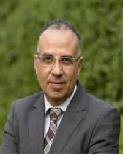
Biography:
Hani Sewilam is a professor of sustainable development and water resources management. Sewilam is the managing director of the UNESCO Chair on Hydrological Changes and Water Resources Management at the RWTH Aachen University in Germany. He joined the AUC as a professor for sustainable development and water resources management and founded the Center for Sustainable Development and the graduate program in Sustainable Development. He coordinated capacity development activities of the United Nations Water between 2010 and 2011. Sewilam is also worked at the RWTH Aachen University in Germany as the academic director of the Department of Engineering Hydrology. From 2002 to 2010, Sewilam worked as the deputy director for the Department of Engineering Hydrology at the RWTH Aachen University. He managed many international research and capacity building projects in 21 countries.
In 2008, he established the first North African Regional Center of Expertise on Education for Sustainable Development (RCE Cairo) which is acknowledged by the United Nations University. Sewilam worked for the Egyptian National Water Research Center as a researcher and coordinator for development projects with several UN organizations.
He has more than 20 years of academic and professional experience in the fields of sustainable development, water resources, e-learning and capacity building. He authored many peer-reviewed scientific papers and book chapters. Sewilam served as a consultant and reviewer for several international research and development organizations. Sewilam holds a PhD in water resource management from the RWTH Aachen University (Germany), MS in irrigation management from Southampton University (UK) as well as a graduate diploma and BS in irrigation and environmental engineering management.
Abstract:
Education for Sustainable Development: What about the Poor?
The relationship between poverty and education operates in two directions. Poverty is restricting people from having access to adequate education and without adequate education mostly they will stay poor. Throughout the world it has been found that earnings are higher for people with higher levels of education, but which type of education ensures a high quality of life for the current generation and enable the next generations to have their rights of high quality of life? Many countries focus on education that enables high economic development. This type of development that focuses only on economic growth has increased water, air and soil pollution, caused health problems and endangered our resources, as did careless disposal of waste water and trash. Poor countries have been suffering over decades from such unsustainable development practices that, in an effort to increase the economic wellbeing, have caused enormous damages to the society and the environment. This unsustainable development is a result of lack of education or lack of introducing the concept of sustainability in our education system. Therefore, our education should be shifted to Education for Sustainable Development (ESD).
Education for Sustainable Development was first explained in Agenda 21 at the Earth Summit in Rio de Janeiro in 1992. Education for Sustainable Development aims to develop and strengthen the capacity of individuals, groups, communities, organizations and countries to make judgments and choices in favor of sustainable development. ESD involves exploring sustainability issues from a local, national and global perspective and should develop critical and creative thinkers who feel empowered to act as responsible citizens. One of the core principles underpinning ESD is the development of critical thinking skills, analytical skills, empathetic capacity and the ability to be an effective person who can take action to achieve desired development outcomes. The main challenges to implement ESD in developing countries can be summarized in;
a) teachers/trainers? skills and knowledge of ESD principles and teaching methodologies,
b) the poor education facilities and lack of resources to afford educational resources,
c) overcrowded classes and lack of infrastructure.
In order to address these challenges in developing countries, EduCamp has been developed as an initiative for introducing ESD in poor schools in developing countries. The main objective of the initiative is to promote and implement Education for Sustainable Development in Egypt nationwide and beyond all education levels, but with an emphasis on public schools. The consortium members of this project included Egyptian and European universities, NGOs, and international organizations. The main achievements of this project are the following:
*Development of ESD resource kits for schools to provide activities for teachers and students that link directly to the existing school curriculum. The tools required are requiring minimum resources to enable any poor school to implement and use them.
* Development of a School Teachers? Training Programme (STTP) to enable teachers to implement ESD and use the kits in their teaching activities.
* Establishment of seven Centers of Excellence hosted by seven Egyptian Universities.
They aim to promote and support the introduction of ESD into the education system, provide teachers? training programs and consultancy services.
EduCamp is one of the promising initiatives developed mainly to enable introducing ESD in the schools of developing countries to enable them to fight poverty and ensure their sustainability.